This past year, 2019, was a weird one. It began in utter darkness and hopelessness. I was in year six of a chronic illness. I had lost everything and had no reason to believe things would change.
But things did change.
I won’t go into the hows and whys. I did that already. I only write the above paragraph because my “situation” kept me from reading even a single page of a book for the first six months of the year. So, both the quantity and diversity of books are down this year. Nonetheless, I was able to read 24 books (if you want a complete list of the books I read in 2019, sign up for my newsletter). I want to share the ones that impacted me the most. I’ll do a countdown-type list because people like that kind of thing, but the numbers are arbitrary: I could make a case for all of these books taking the top spot.
Here we go.
10. Gilead by Marilynne Robinson
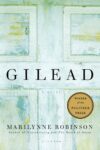 Gilead is a book about love and loss, about fathers and sons. It’s emotionally and theologically rich, and it’s beautifully written. The novel is set in 1956 when John Ames, a third-generation preacher, decides to write a letter to his seven-year-old son. John is 76 and dying, so he sets out to give his son a way to remember him. This meditative letter helps you see the importance of loyalty to a community and the transformative power of regular life and the sacredness of every single moment. Gilead won the Pulitzer Prize in Fiction, and for good reason.
Gilead is a book about love and loss, about fathers and sons. It’s emotionally and theologically rich, and it’s beautifully written. The novel is set in 1956 when John Ames, a third-generation preacher, decides to write a letter to his seven-year-old son. John is 76 and dying, so he sets out to give his son a way to remember him. This meditative letter helps you see the importance of loyalty to a community and the transformative power of regular life and the sacredness of every single moment. Gilead won the Pulitzer Prize in Fiction, and for good reason.
9. The Enigma of Anger by Garrett Keizer
 I have a history with anger. And most of it is bad. The Christian community, unfortunately, has not helped me in this regard. I have mostly heard that anger is sin and never useful. So, rather than investigate the source my anger, I suppressed it. Though I couldn’t verbalize why, I’ve always believed anger has value. It serves some purpose, and for those of us who struggle with anger, understanding this purpose could lead us on a path to transformation. This book finally gave my intuitions some flesh. It helped me see why my anger exists and how I can use it in my journey towards wholeness.
I have a history with anger. And most of it is bad. The Christian community, unfortunately, has not helped me in this regard. I have mostly heard that anger is sin and never useful. So, rather than investigate the source my anger, I suppressed it. Though I couldn’t verbalize why, I’ve always believed anger has value. It serves some purpose, and for those of us who struggle with anger, understanding this purpose could lead us on a path to transformation. This book finally gave my intuitions some flesh. It helped me see why my anger exists and how I can use it in my journey towards wholeness.
8. Thank You for Being Late by Thomas L. Friedman
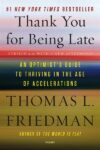 This book has huge implications for our society, yes, but also for the church. If you want to know why anxiety and fear are ever-increasing, Thomas Friedman tells you why. He explains how the world is accelerating at a faster rate than any point in history. The world is changing and to thrive in a changing world, we must become self-learners. We must become adaptable, forward-thinkers. The implications for the church relate to the institution, and in particular, the massive structures we’ve built. While our world becomes more transient, we build million dollar buildings and campuses, and I wonder what our insistence on meeting in thee buildings means for the next generation. I’m afraid we’re leaving them with mountains of debt and real estate that will be un-sellable. This book is important for everyone, but I think it’s a must-read for pastors and teachers and leaders.
This book has huge implications for our society, yes, but also for the church. If you want to know why anxiety and fear are ever-increasing, Thomas Friedman tells you why. He explains how the world is accelerating at a faster rate than any point in history. The world is changing and to thrive in a changing world, we must become self-learners. We must become adaptable, forward-thinkers. The implications for the church relate to the institution, and in particular, the massive structures we’ve built. While our world becomes more transient, we build million dollar buildings and campuses, and I wonder what our insistence on meeting in thee buildings means for the next generation. I’m afraid we’re leaving them with mountains of debt and real estate that will be un-sellable. This book is important for everyone, but I think it’s a must-read for pastors and teachers and leaders.
7. Quiet by Susan Cain
 We live in a culture that idealizes and at times idolizes extroversion. This book was so enlightening and therapeutic. As an introvert, not only did I find peace in my temperament, but I grew in my conviction that introverts have a lot to offer the world. This is not just a book for introverts. It’s a book for everyone, to help us understand that we have much to gain from silence and contemplation and patience.
We live in a culture that idealizes and at times idolizes extroversion. This book was so enlightening and therapeutic. As an introvert, not only did I find peace in my temperament, but I grew in my conviction that introverts have a lot to offer the world. This is not just a book for introverts. It’s a book for everyone, to help us understand that we have much to gain from silence and contemplation and patience.
6. Let Your Life Speak by Parker Palmer
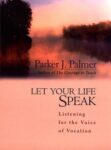 How is that no one has turned me on to Parker Palmer before this year? Shame on you. All of you. This is a book about vocation. But it is more about wholeness, which makes it the very best collection of words on vocation I have ever read. We blow a lot of hot air and fill a lot of white space talking about calling and making your life count. But we don’t talk as much about wholeness, as if you can have one without the other.
How is that no one has turned me on to Parker Palmer before this year? Shame on you. All of you. This is a book about vocation. But it is more about wholeness, which makes it the very best collection of words on vocation I have ever read. We blow a lot of hot air and fill a lot of white space talking about calling and making your life count. But we don’t talk as much about wholeness, as if you can have one without the other.
5. When Bad Things Happen to Good People by Harold Kushner
 I needed this book, as my own battle with chronic illness has left me jaded with both God and God’s people. We need a fresh theology of suffering. We need it desperately. Not everything happens for a reason. Sometimes suffering just happens. And sometimes it can’t be prayed away. And maybe the Great Healer is a poor metaphor for God. Sorry, I’m rambling. Anyway, this book was a life raft in a season where I was drowning in anger and disillusionment and despair.
I needed this book, as my own battle with chronic illness has left me jaded with both God and God’s people. We need a fresh theology of suffering. We need it desperately. Not everything happens for a reason. Sometimes suffering just happens. And sometimes it can’t be prayed away. And maybe the Great Healer is a poor metaphor for God. Sorry, I’m rambling. Anyway, this book was a life raft in a season where I was drowning in anger and disillusionment and despair.
4. Range by David Epstein
 Range was an affirmation of the way I’ve chosen to go about my days. So, this book meant a lot to me on a personal and professional level. It challenged me to continue learning and to engage new disciplines and such. But David Epstein’s words also resonated to me as a parent. This is a parenting book, as much as anything. It’s a call to stop drinking the cultural kool-aid, to step back from the increasing demands to force our kids into specialization, to let our kids be kids, to let them explore and engage in a wide range of interests and hobbies and activities. It’s refreshing and important and timely.
Range was an affirmation of the way I’ve chosen to go about my days. So, this book meant a lot to me on a personal and professional level. It challenged me to continue learning and to engage new disciplines and such. But David Epstein’s words also resonated to me as a parent. This is a parenting book, as much as anything. It’s a call to stop drinking the cultural kool-aid, to step back from the increasing demands to force our kids into specialization, to let our kids be kids, to let them explore and engage in a wide range of interests and hobbies and activities. It’s refreshing and important and timely.
3. The Universal Christ by Richard Rohr
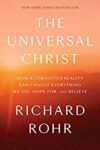 Any book I read by Richard Rohr will make it on my top books list. In The Universal Christ, Rohr re-imagines Christ. Christ is not Jesus’s last name but a cosmic reality that transcends time and place. Christ is God and Jesus is the manifestation of the Christ. This is no small distinction; it’s a paradigm shift. It changes everything. You’ll see why if you read the book.
Any book I read by Richard Rohr will make it on my top books list. In The Universal Christ, Rohr re-imagines Christ. Christ is not Jesus’s last name but a cosmic reality that transcends time and place. Christ is God and Jesus is the manifestation of the Christ. This is no small distinction; it’s a paradigm shift. It changes everything. You’ll see why if you read the book.
2. Amazing Grace: A Vocabulary of Faith by Kathleen Norris
 Amazing Grace is a meditation on the language of faith, an attempt to re-define or re-imagine some of the foundational words of the Christian vocabulary. And I’m here for it. Words like “judgement,” fear,” “salvation,” and “sinner” have become off-putting, even traumatic, for many disillusioned believers, myself included. Kathleen Norris, with her anti-pious, inviting writing style, gives us a less frightening and more usable Christian lexicon.
Amazing Grace is a meditation on the language of faith, an attempt to re-define or re-imagine some of the foundational words of the Christian vocabulary. And I’m here for it. Words like “judgement,” fear,” “salvation,” and “sinner” have become off-putting, even traumatic, for many disillusioned believers, myself included. Kathleen Norris, with her anti-pious, inviting writing style, gives us a less frightening and more usable Christian lexicon.
1. Consolations by David Whyte
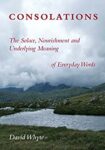 This is the most luminous and maybe the most important book I read in 2019. Reading it resurrected my love for words and for writing. This is the kind of book that can’t be described; it can only be read and experienced. Powerful.
This is the most luminous and maybe the most important book I read in 2019. Reading it resurrected my love for words and for writing. This is the kind of book that can’t be described; it can only be read and experienced. Powerful.
________
What about you? What books impacted you in the past year? Leave a comment below. I pray blessings on you and those you love in 2020.
Grace and peace, friends.

